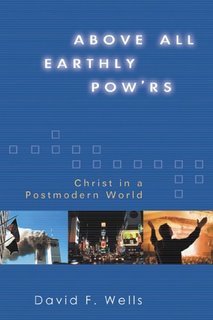 I am talking about Above All Earthly Pow’rs: Christ in a Postmodern World by David F. Wells. Today, I started reading this highly touted book and must say, from what I have read thus far, it is living up to its praise. Whatever you are reading (apart from the Bible of course), let me encourage you to get this book and contemplatively go through it. After that, consider and chomp on No Place for Truth, God in the Wasteland, and Losing Our Virtue – the three previous works in the series. With no hyperbole intended, I believe this series will be required reading for generations to come as the best treatment of truth, evangelicalism, and our culture at the turn of the 21st century. Douglas Groothuis has written a review which would be worth your time checking out. His concluding statement was,
I am talking about Above All Earthly Pow’rs: Christ in a Postmodern World by David F. Wells. Today, I started reading this highly touted book and must say, from what I have read thus far, it is living up to its praise. Whatever you are reading (apart from the Bible of course), let me encourage you to get this book and contemplatively go through it. After that, consider and chomp on No Place for Truth, God in the Wasteland, and Losing Our Virtue – the three previous works in the series. With no hyperbole intended, I believe this series will be required reading for generations to come as the best treatment of truth, evangelicalism, and our culture at the turn of the 21st century. Douglas Groothuis has written a review which would be worth your time checking out. His concluding statement was,
“One is tempted to quote further from this wise theologian and social critic; in fact, I underlined more of this book than any in recent memory. But instead of drawing out this review any further, I instead heartily recommend that the reader purchase and carefully consider the insights of Above All Earthly Pow’rs–and continue to sing the hymn from which the title is taken.”
I expect to go through many highlighters on this one as well. For those who want to discuss the material in this book, I would be happy to do so. As Wells shared about his “fraternity of discourse,” it wouldn’t hurt to have one on the blogosphere either. My plans are to read a chapter a day with a break halfway for contemplation and review. I hope to complete it by the end of next week. Let me share one quote that Wells makes about the Word of God with you:
“For it is certainly the case that the Word of God, read or preached, has the power to enter the innermost crevices of a person’s being, to shine light in unwanted places, to explode the myths and deceits by which fallen life sustains itself, and to bring that person face to face with the eternal God. It is this biblical Word which God uses to bring repentance, to excite faith, to give new life, to sustain that life once given, to correct, nurture, and guide the Church. The biblical Word is self-authenticating under the power of the Holy Spirit. This Word of God is the means by which God accomplishes his saving work in his people, and this is a work that no evangelist and no preacher can do. This is why the dearth of serious, sustained biblical preaching in the Church today is a serious matter. When the Church loses the Word of God it loses the very means by which God does his work. In its absence, therefore, a script is being written, however unwittingly, for the Church’s undoing, not in one cataclysmic moment, but in a slow, inexorable slide made up of a piece by tiny piece of daily dereliction” (9).
Amen and amen!
Note: As a foundation to this work, Wells encourages readers to get his previous work called The Person of Christ: A Biblical and Historical Analysis of the Incarnation (Good News Publishers, 1984). Currently, this book is only available used. Buying options can be found here.